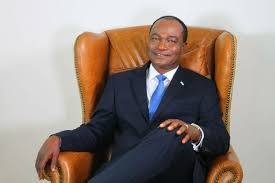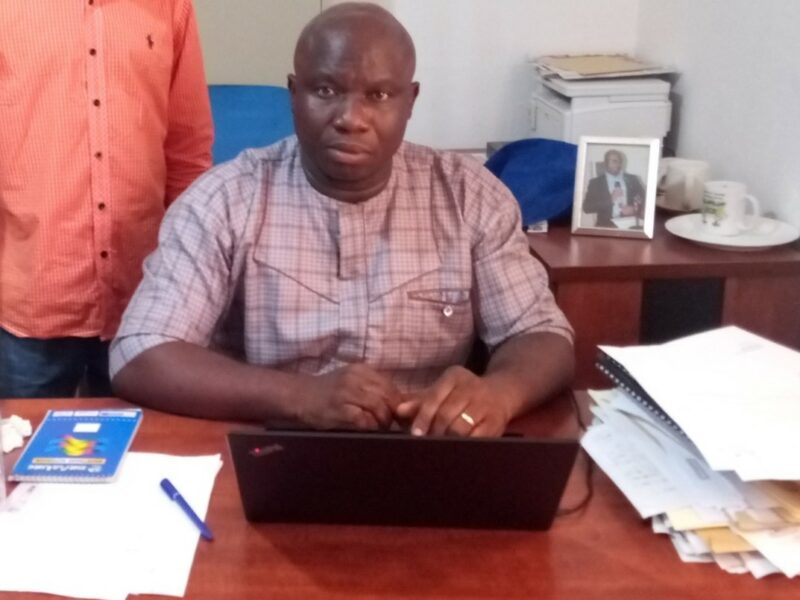The power of the governed is mightier than the power of the governors
In 2009, after my first assignment as a Legal and Policy Adviser in Sierra Leone, I wrote an open letter to our President of our beloved Sierra Leone. In that letter I pinpointed in a no-nonsense way the state of human rights in Sierra Leone, making reference to the manifesto of APC that brought them to power. (Photo: Mohamed Kunowah Tinu-Kiellow, author)
I got a sea of mails from people who read the letter. Many people appreciated the truth I told in my letter. Many others wrote a tsunami of mails calling me names that did not befit my reputation and status. One of such people called me an ‘SLPP maggot.’ To this person I said: you are getting it wrong. I am not a member of SLPP. Neither have I been a member. I have never been a beneficiary of SLPP’s hand-outs. Few of such people sent me a death threat. They threatened that I would be killed if I went to Sierra Leone. To this people I said: I am a Sierra Leonean and your threat will not deter me from coming to Sierra Leone. You may kill me but you will not kill what I stand for: justice and accountability for all Sierra Leoneans. I reminded those unpatriotic people that the power belongs to us, the people of Sierra Leone and not to parliament or the cabinet. Further, I told them it was this same intolerance that plunged Sierra Leone in a civil war that claimed a lot of innocent lives. It was against this backdrop that decided to write on sovereignty of the people of Sierra Leone and the inability of the legislature to carry out its constitutional power effectively.
In concluding my open letter to our President I quoted Abraham Lincoln that once said that ‘you can fool some of the people all of the time, and all of the people some of the time, but you cannot fool all of the people all of the time.’ This quotation plainly makes clear that leaders of any nation should be honest in all their dealings with the governed. Since gaining independence, many states in Africa have been ruled by greedy African leaders. They have ruled their people with arrant brutality, willful scorn and transparent lies. They have been able to divide their governed along tribal, political and social lines and rule them in a manner suiting their whims and caprices. This manner of rule has caused untold suffering to the people of Africa.
The rulers of Sierra Leone are no exception to this miscreant and ungodly manner of rule that has caused a lot of suffering in Sierra Leone. The people of Sierra Leone do the dirty political work by voting for people who do not have their best interests at heart. During election time, the politicians promise the people the moon: they will provide clean water, adequate housing, affordable medical care and abundant food supply. These are all economic and social rights which are an important cog in the machine of a smooth functioning of human rights in a society. The people find these rights so important that they vote for any party that has the most ambitious manifesto covering these areas.
However, it is sad to know that both past and present elected ‘servants’ have failed and are continuing to fail us. Instead these ‘servants’ have usurped our power and made themselves masters that continue to enrich themselves. The ‘servants-turned-masters’ do not fulfill their promises as regards respecting, promoting and fulfilling these economic and social rights. In lieu thereof, they refer the unfortunate people of Sierra Leone to Section 14 of the Constitution which states that the ‘rights’ enshrined in chapter two of the 1991 Constitution are no rights but principles of state policies. They lie to the governed in believing that these rights will be respected, while actually they very well know that they will deceive and fail them in an alarming proportion.
They forget to remember that the main purpose of the government is to enable the people to live in happiness and safety. They also fail to realize that ‘government exists for the interests of the governed, not for the governors’. As Benjamin Franklin wrote, ‘In free governments the rulers are the servants and the people their superiors and sovereigns.” In other words, it is therefore true that, ‘The ultimate powers in a society, therefore, rest in the people themselves, and they should exercise those powers, either directly or through representatives, in every way they are competent and that is practicable’.
The Sierra Leone constitution also gives sovereignty to the people. According to section 5 paragraph 2a ‘….. Sovereignty belongs to the people of Sierra Leone from whom Government through this Constitution derives all its powers, authority and legitimacy.’ By sovereignty of the people is meant ‘the belief that the legitimacy of the state is created by the will or consent of its people, who are the source of all political power. That is exactly what the constitution of Sierra Leone provides for. All Members of Parliament, ministers, vice president and the president owe their power to the people. They are mere servants to the people of Sierra Leone, because without their blessing they are powerless and illegitimate.
The legislators of Sierra Leone should now know that they come to parliament because the people want them to be there on there behalf. They therefore expect that the MPs seek their best interest whilst they are in parliament. They should represent the people and use the power they give to them to improve all aspects of their lives in Sierra Leone. They should be very instrumental in making laws that are beneficial to the people of Sierra Leone.
It is rather unfortunate that some of the MPs are not working in the interest of the people-their masters. According to most of them, they are demoralized because of the meager salary they receive. They get such a very low salary that they are not ready to make any meaningful contribution to the human development of their electorate who give them power. They even are not ready to make any sacrifice that will be beneficial to the people they are supposed to represent. As far as I am concerned, it is not only the low salary that is ebbing away their motivation to carry out their constitutional duties. There are other reasons.
First, some of the MPs cannot express themselves very effectively in English although the constitution states that ‘the business of Parliament shall be conducted in the English Language’. They therefore are not able to critically participate in parliamentary debates on bills that are to become laws. This lack of effective English knowledge contravenes section 75d of the 1991 Constitution which stipulates that a person can become a member of parliament if he/she ‘is able to speak and to read the English Language with a degree of proficiency sufficient to enable him to take an active part in the proceedings of Parliament.’ This makes it very difficult or even impossible for many MPs to effectively represent their people who vote for them. They cannot meaningful contribute to debates that are important to improving the social and economic lives of the people they are supposed to represent. To my mind, these MPs are not representatives of the people who made them MPs as they alienate themselves from their voters through their inactiveness in Parliament. This contravenes section 97b which states that Members of Parliament shall regard themselves as representatives and should desist from any conduct that will lead to alienating themselves from the people. During very important parliamentary debates that affect the lives of we the ordinary Sierra Leoneans, it is appalling to see that most sits are empty. Most MP’s only come to parliament when it is time to receive their salaries.
Another problem is the fact that some MPs are not conversant with provisions of the constitution that proscribe their constitutional responsibilities. This hinders them from representing in a correct manner the people they are bound to represent. Section 107(2), for example, stipulates that a Minister may be summoned before Parliament or a Committee thereof in order to give an account of any matter falling within his portfolio or to explain any aspect of Government policy. I wonder if the parliament makes use of this task to monitor the executive. The parliament can, for example, summon the Minister of Interior to answer questions pertaining to the purchase of arms that cost poverty-stricken Sierra Leone Five million Dollars. The human rights committee in parliament can also perform this task.
I am not sure this has ever happened. Not even during the reign of SLPP when Mr. Tejan Kabba was the president of the republic and the Minister of Defence at the same time. I am not sure Parliament ever summoned president Kabba to answer questions surrounding the situation in Yenga.. Did Parliament ever summon the responsible Minister to give an account of the riot that took place last year in Bo and some other parts of Sierra Leone? Or did human rights committee call the responsible Minister to give an account of the human rights violations that took place during that riot? I would be very grateful if a Member of Parliament furnished me with facts surrounding the activities of the Parliament regarding this incident. In my opinion, this shirk of responsibility is partly due to the fact the executive is so powerful that MPs never take the bold step to question them about policies that affect the people they are supposed to represent. The parliament has to make use of this power more often to hold the executive people accountable for any misrule.
Section 14 of the Constitution stipulates that the provisions contained Chapter Two shall not confer legal rights and shall not be enforceable in any court of law, but the principles contained therein shall nevertheless be fundamental in the governance of the State, and it shall be the duty of Parliament to apply these principles in making laws. It is therefore the duty of the Parliament to consider these ‘rights’ when they are making laws in that these ‘rights’ are indispensable to the socio-economic development of the people of Sierra Leone. Parliament can also make use of section 106(9) which provides that ‘nothing in this section or in section 53 of this Constitution shall prevent Parliament from conferring on any person or authority the power to make statutory instruments.’
The people of Sierra Leone need more civic education on how to hold the government accountable, especially now elections are imminent. Socio-economic development only begins when we are knowledgeable about holding the executive, the legislative and judiciary accountable for misrule and misuse of power and office.
Mohamed Kunowah Kiellow. Amsterdam, The Netherlands.
The author is Dutch-Sierra Leonean human rights lawyer currently working with Coalition for Justice and Accountability (COJA) as legal adviser. He was deployed by International Organization for Migration(IOM). mkunowahkiellow@yahoo.com
Stay with Sierra Express Media, for your trusted place in news!
© 2012, https:. All rights reserved.






